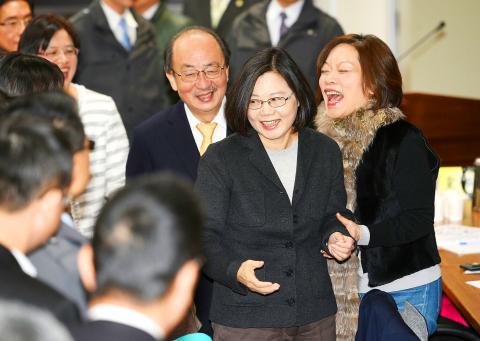President-elect Tsai Ing-wen (蔡英文) yesterday said she would respect the Democratic Progressive Party (DPP) caucus’ choice of legislative speaker for the incoming ninth legislature following the Jan. 16 elections.
Tsai made the remarks at a DPP caucus meeting in Taipei, which is to set new rules for the caucus and the procedures to appoint a speaker.
“The public is concerned with the Feb. 1 appointment of the new legislative speaker, and my approach is to honor the decision that the caucus will make as a body,” she said.

Photo: Chang Chia-ming, Taipei Times
The DPP made history by effecting the first party alternation in the legislature and must meet the expectations of the people by making the legislature a body that is “of the people,” focusing on professionalism and transparency, Tsai said.
“The elections are over and reform starts now,” she said, urging all parties to “abandon prejudices” and “unite in solidarity.”
Tsai said that the DPP would cooperate with other parties on administrative appointments and legislation to “build consensus” and “maximize energy for reform.”
Regarding the appointment of Premier Simon Chang (張善政) on Monday by President Ma Ying-jeou (馬英九), Tsai said that the constitutional authority of the Presidential Office would be respected, and the DPP would help ensure political stability and the continued functioning of the government.
“Whether it is called an interim or caretaker Cabinet, the administration must perform its assigned function, just as legislators are to carefully supervise and respect the government, especially giving due respect to civil servants who shoulder the burden of maintaining the continuity in governance,” she said.
Tsai added that she sensed a marked change in the mood of the DPP caucus from its previous meeting before the elections, in which every legislator reported that their seat was at risk, as well as her first address in 2008 to the caucus as DPP chairperson, when the party did not have enough legislators to fill the front row.
Unnamed sources in the DPP said that by tradition, leadership positions within the caucus go to vote only after negotiations by contenders had concluded, and it is likely that the positions for legislative speaker and deputy speaker would be filled in the same way.
Three legislators-elect are believed to be running for speaker: Ker Chien-ming (柯建銘), Chen Ming-wen (陳明文) and Su Jia-chyuan (蘇嘉全).
Last week, Tsai spoke against aggressive campaigning for the speaker’s position, which she said might be detrimental to the party’s image, and Ker, Chen and Su’s respective camps toned down their rhetoric.
Reports on Monday said that Tsai’s caucus speech, which required last-minute changes to her schedule, was meant to foil a straw poll covertly planned by an unnamed legislative speaker hopeful, a report DPP Legislator Tsai Chih-chang (蔡其昌) denied.
In other news, in an interview on Monday with the radio channel Super FM98.5, Ker promised to open legislative sessions to citizen reporters, saying that a lack of transparency had been caused by the “too conservative” approach of KMT Legislative Speaker Wang Jin-pyng (王金平), and that he considers the most important task of the next legislative speaker is “repairing the Legislative Yuan’s reputation.”

US President Donald Trump yesterday announced sweeping "reciprocal tariffs" on US trading partners, including a 32 percent tax on goods from Taiwan that is set to take effect on Wednesday. At a Rose Garden event, Trump declared a 10 percent baseline tax on imports from all countries, with the White House saying it would take effect on Saturday. Countries with larger trade surpluses with the US would face higher duties beginning on Wednesday, including Taiwan (32 percent), China (34 percent), Japan (24 percent), South Korea (25 percent), Vietnam (46 percent) and Thailand (36 percent). Canada and Mexico, the two largest US trading

China's military today said it began joint army, navy and rocket force exercises around Taiwan to "serve as a stern warning and powerful deterrent against Taiwanese independence," calling President William Lai (賴清德) a "parasite." The exercises come after Lai called Beijing a "foreign hostile force" last month. More than 10 Chinese military ships approached close to Taiwan's 24 nautical mile (44.4km) contiguous zone this morning and Taiwan sent its own warships to respond, two senior Taiwanese officials said. Taiwan has not yet detected any live fire by the Chinese military so far, one of the officials said. The drills took place after US Secretary

CHIP EXCEPTION: An official said that an exception for Taiwanese semiconductors would have a limited effect, as most are packaged in third nations before being sold The Executive Yuan yesterday decried US President Donald Trump’s 32 percent tariff on Taiwanese goods announced hours earlier as “unfair,” saying it would lodge a representation with Washington. The Cabinet in a statement described the pledged US tariffs, expected to take effect on Wednesday next week, as “deeply unreasonable” and “highly regrettable.” Cabinet spokeswoman Michelle Lee (李慧芝) said that the government would “lodge a solemn representation” with the US Trade Representative and continue negotiating with Washington to “ensure the interests of our nation and industries.” Trump at a news conference in Washington on Wednesday announced a 10 percent baseline tariff on most goods

‘SPECIAL CHANNEL’: Taipei’s most important tasks are to stabilize industries affected by Trump’s trade tariffs and keep negotiations with Washington open, a source said National Security Council Secretary-General Joseph Wu (吳釗燮) arrived in the US for talks with US President Donald Trump’s administration, a source familiar with the matter said on Friday. Wu was leading a delegation for a meeting known as the “special channel,” the Financial Times reported earlier. It marked Trump’s first use of the channel since returning to the White House on Jan. 20. Citing a source familiar with the matter, the Financial Times reported that Minister of Foreign Affairs Lin Chia-lung (林佳龍) was also a part of the delegation. The visit came days after China concluded war games around Taiwan and amid Trump’s